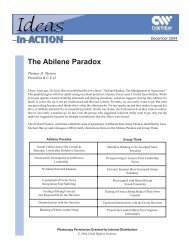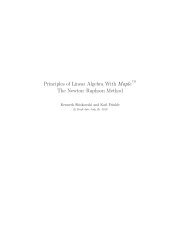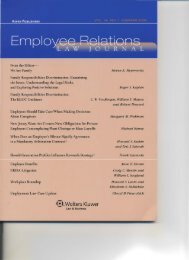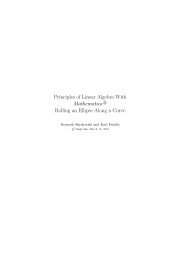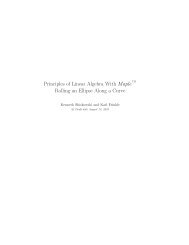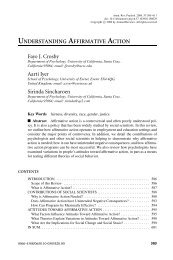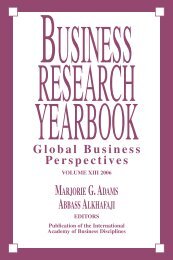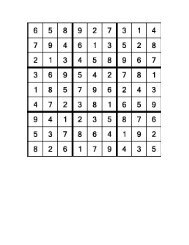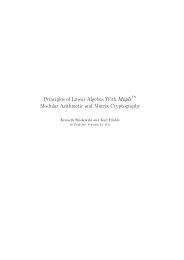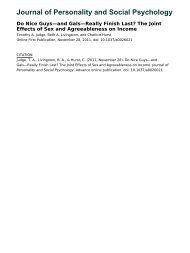www.SE.edu 1-800-435-1327 - Southeastern Oklahoma State ...
www.SE.edu 1-800-435-1327 - Southeastern Oklahoma State ...
www.SE.edu 1-800-435-1327 - Southeastern Oklahoma State ...
You also want an ePaper? Increase the reach of your titles
YUMPU automatically turns print PDFs into web optimized ePapers that Google loves.
BLAW 3223 COMMERCIAL LAW This course will consist of<br />
the study of the Uniform Commercial Code, with special emphasis<br />
on sales of goods, commercial paper and negotiable instruments,<br />
secured transactions, bankruptcy and creditors rights, proprietorships,<br />
partnerships, corporations, antitrust law, and the laws effecting<br />
entrepreneurs. The concepts of ethics and proper business conduct<br />
will be emphasized throughout the course. (Prerequisite: BLAW 3123)<br />
CHEMISTRY (CHEM)<br />
CHEM 1004 #CHEMICAL CONCEPTS A one-semester course<br />
for students with a degree plan such as nursing that has a onesemester<br />
chemistry requirement. This course is also recommended<br />
for students who need additional preparation before either of the<br />
other two tracks of chemistry or for those who wish to use the study<br />
of chemistry to satisfy their general <strong>edu</strong>cation requirement. It includes<br />
fundamental knowledge of inorganic chemistry; with laboratory (2hr/<br />
wk) (Prerequisite: Elementary high school algebra skills. It may not<br />
be used on any major or minor)<br />
CHEM 1114 #BASIC CHEMISTRY I The first semester of chemistry<br />
for students with a degree plan that requires a broad foundation<br />
in chemistry. This course is the ideal entry point for students who<br />
will major in Occupational Safety and Health, those who will minor in<br />
Chemical Sciences or Environmental Sciences or who need only one<br />
year of general chemistry. It includes nomenclature, stoichiometry,<br />
atomic structure, chemical bonding, solutions; gas laws and thermochemistry;<br />
with laboratory (2hr/wk) This course does NOT satisfy the<br />
prerequisite for CHEM 1415. Corequisite: MATH 1303 or higher or<br />
two units of high school algebra<br />
CHEM 1214 #BASIC CHEMISTRY II The second semester of<br />
chemistry for students with a degree plan that requires a broad foundation<br />
in chemistry. It is a continuation of CHEM 1114 and includes<br />
equilibrium, kinetics, thermodynamics, electrochemistry, qualitative<br />
analysis, organic chemistry, biochemistry and nuclear chemistry;<br />
with laboratory. This course can be used as a prerequisite for CHEM<br />
1415, CHEM 2014 or CHEM 2024. This course does NOT satisfy<br />
the prerequisite for CHEM 3053/3062 or CHEM 3425.(Prerequisite:<br />
CHEM 1114)<br />
CHEM 1315 #GENERAL CHEMISTRY I This first semester of<br />
study is for students with a degree plan that requires an algebra-based,<br />
in-depth knowledge in chemistry. This course is the entry point for<br />
students who will major in Chemistry, Biotechnology, and Medical<br />
Sciences; for all students meeting general chemistry requirements<br />
for entrance into programs of advanced healthcare degrees and a<br />
Chemistry minor. It includes nomenclature, atomic and molecular<br />
structure, stoichiometry, bonding, states of matter, thermochemistry,<br />
acids and bases, and gas laws; with laboratory (4hr/wk) (Prerequisite:<br />
one year of high school chemistry) Corequisite: College Algebra or<br />
ACT Math score of 21 or better.<br />
CHEM 1415 #GENERAL CHEMISTRY II The second semester<br />
of study for students with a degree plan that requires an algebra-based,<br />
in-depth knowledge in chemistry. It is a continuation of CHEM 1315<br />
with emphasis on kinetics, equilibrium, thermodynamics, electrochemistry,<br />
qualitative analysis, organic chemistry, biochemistry, and<br />
nuclear chemistry; with laboratory (4hr/wk) This course satisfies the<br />
prerequisite for CHEM 3053/3062 and CHEM 3425. (Prerequisite:<br />
CHEM 1315 with a grade of C or better)<br />
CHEM 2014 #ORGANIC CHEMISTRY/BIOCHEMISTRY Terminal<br />
course for students whose major does not require additional<br />
chemistry courses, e.g., science <strong>edu</strong>cation. This course is an introduction<br />
to organic chemistry and biochemistry and will not count towards a<br />
Course Descriptions 173<br />
major or minor in chemistry but will count towards a minor in Chemical<br />
Sciences; with laboratory (4hr/wk). (Prerequisite: CHEM 1214 or 1415<br />
with a grade of C or better)<br />
CHEM 2024 INTRODUCTION TO ANALYTICAL METHODS<br />
This course is designed to introduce the student to classical wet and<br />
modern instrumental analytical chemistry. The fundamentals of analytical<br />
statistics and its importance to data reliability will be discussed.<br />
The course will cover acid/base calculations, titrations, basic chemical<br />
equilibrium, atomic and molecular spectroscopic, chromatographic,<br />
and electro analytical methods of analysis. Much of the laboratory<br />
experience will focus on modern methods of environmental analysis.<br />
This course will count toward a Chemical Sciences minor but will not<br />
count towards a Chemistry Major (Prerequisite: CHEM 1214 or 1415<br />
with a grade of C or better)<br />
CHEM 2113 #INORGANIC CHEMISTRY I Periodic properties<br />
of the elements and the structures, properties, and reactions of their<br />
compounds. (Prerequisite: CHEM 1214 or 1415 with a grade of C or<br />
better or departmental approval) (Previously listed as CHEM 2112,<br />
Intermediate Inorganic Chemistry)<br />
CHEM 3053 #ORGANIC CHEMISTRY I Introductory course<br />
emphasizing structure and reaction mechanisms of aliphatic and<br />
aromatic compounds. (Prerequisite: CHEM 1415 with a grade of C<br />
or better) Corequisite: CHEM 3062<br />
CHEM 3062 #ORGANIC CHEMISTRY I LABORATORY Techniques<br />
such as purification/separation, physical characterization,<br />
reaction types, and synthesis of organic compounds. (Prerequisite<br />
or Corequisite: CHEM 3053)<br />
CHEM 3153 #ORGANIC CHEMISTRY II Continuation of CHEM<br />
3053 with emphasis on other major classes of organic compounds.<br />
(Prerequisite: CHEM 3053 with a grade of C or better) Corequisite:<br />
CHEM 3162<br />
CHEM 3162 #ORGANIC CHEMISTRY II LABORATORY Multistep<br />
syntheses and identification of organic compounds, including<br />
instrumental methods. (Prerequisite or Corequisite: CHEM 3153)<br />
CHEM 3425 #CHEMICAL ANALYSIS Introductory course including<br />
treatment of analytical data, chemical equilibriums, volumetric<br />
measurements, spectrophotometry, separations and electro analytical<br />
methods; with laboratory (4 hr/wk). (Prerequisite: CHEM 1415 with<br />
grade of C or better)<br />
CHEM 3525 #INSTRUMENTAL ANALYSIS Topics include basic<br />
electronics, computer control of chemical instrumentation, spectral,<br />
electrochemical and chromatographic methods of analysis, and laboratory<br />
automation; with laboratory (4hr/wk). (Prerequisite: CHEM 3425<br />
with a grade of C or better)<br />
CHEM 3612 #RADIOACTIVITY & NUCLEAR MEASUREMENT<br />
Study of nuclear disintegrations and properties of alpha, beta, and<br />
gamma radiation; with laboratory. (Prerequisite: PHYS 1214 or 2115<br />
or CHEM 1415) (Same as PHYS 3612)<br />
CHEM 3644 CHEMICAL TECHNOLOGY Survey of industrial<br />
processes; special experimental problems in technique development;<br />
with laboratory. (Prerequisites: CHEM 2014 or 3055, and CHEM 3425)<br />
CHEM 4055 #ADVANCED ORGANIC CHEMISTRY Emphasizes<br />
recent developments in the field. With laboratory. (Prerequisite: CHEM<br />
3153 [with a grade of C or better] and CHEM 3162)



